Bankwest Credit Cards

A household name in Australia, Bankwest provides a wide range of financial products and services including home loans, personal loans and credit cards. Bankwest focuses on service, providing value in its low rate and low fee cards and perks with its rewards cards.

Bankwest Qantas Platinum Credit Card
No foreign transaction fees on online and overseas purchases
Discontinued: Bankwest Business Large Rewards Mastercard
28,000 bonus points
We found no credit cards using your selected criteria
Update your filters to get more cards to display. Reach out if you are having any problems.
Bankwest - Over 100 years
An Australian name for more than a century, Bankwest is a division of the Commonwealth Bank and offers a wide range of financial products. Its extensive choice of credit cards range from low-fee through to platinum rewards cards that can link to Qantas Frequent Flyer or its own Bankwest points program.
Types of Bankwest Credit Cards
To help you choose the best Bankwest credit card for you, we're going to look at the different cards Bankwest offers, and dig into who they work best for. We'll explore what you need to know, and the pros and cons of each option.
What low rate credit cards does Bankwest offer?
A low rate credit card has a low ongoing purchase rate (the interest applied to any money you owe). Within Bankwest's range of low rate credit cards, its Breeze collection provides the bank's lowest ongoing purchase rate. These include the Bankwest Breeze Mastercard and the Bankwest Breeze Platinum Card.
Why should you choose this type of card?
A low rate credit card can help you keep costs down if you tend to carry a balance month-to-month, instead of paying off the card in full.
Standard credit cards can have purchase rates that reach 22% p.a. and higher. If you carry a balance on these cards, interest will stack up pretty quickly. Low rate credit cards tend to have purchase rates between 9% p.a. and 13% p.a., which saves money and helps you pay off your debt faster.
A low rate card can also be a good choice for first-time cardholders. When you start out, it can be easy to overspend (it feels like free money, until it isn't!). But, with a low rate card, interest payments will remain lower as that balance gets repaid.
What should you look out for?
If a card has a low interest rate, there might be a counterbalance somewhere. If rates are low, annual fees will usually be higher, and vice versa. When you compare low rate cards, you should check the annual fee to make sure the card still offers good value.
Both the Bankwest Breeze Mastercard and the Bankwest Breeze Platinum Card have annual fees in the range you would expect for a low rate card. But, it's up to you to work out whether the low rates and the features on offer are worth the annual fee you'll pay.
It's also worth noting that low rate cards can be lacking in fun features. The Bankwest Breeze Mastercard keeps it pretty simple, but the Bankwest Breeze Platinum Card offers platinum perks, including free insurances and no fees on foreign transactions.
Pros
- Low ongoing purchase rate
- Can help save on interest
- Typically simple in style
- Platinum versions can offer more features
Cons
- Annual fees may be higher
- Not too many features on offer
What no annual fee credit cards does Bankwest offer?
A no annual fee credit card has no annual fee for the life of the card. Each of the cards within Bankwest's Zero collection has no annual fee, with options that include the Bankwest Zero Credit Card and the Bankwest Zero Platinum Mastercard.
Why should you choose this card?
A card with no annual fee is designed to help cardholders save money. Considering some cardholders pay hundreds of dollars in annual fees each year, these cards have the potential to offer ongoing savings, while still providing access to credit and a range of features.
If you're looking to save money on your annual fee, a card with no annual fee could be a good option. Similarly, if you only keep a card for emergencies, a no annual fee card will be there when you need it, but you don’t have to worry about paying annual fees on it in the meantime.
As no annual fee cards tend to have fewer features, they can work well for cardholders who want a basic option. Many cardholders don’t need fancy features, so they obviously don’t want to pay for them. A card with no annual fee can keep things simple, allowing cardholders to only pay for what they actually need.
What should you look out for?
Cards with no annual fees tend to have higher purchase rates. So, if you want to keep costs as low as possible, it’s best to pay your balance in full by the due date each month. In this way, you can keep a credit card in your wallet for ‘free’, by paying no annual fees or interest.
If you want a card packed with features, you may not find what you’re looking for in the no annual fee range. Card providers typically offer big features and big rewards on cards with higher annual fees. If these are the things you want on your credit card, you may have to pay an annual fee.
The Bankwest Zero Credit Card keeps features simple, focusing on keeping costs low with no annual fee. The Bankwest Zero Platinum Card still has no annual fee, but it has a few features, including insurance cover and no foreign transaction fees.
Pros
- No annual fee can keep costs low
- Works well as a ‘just-in-case’ card
- Good for cardholders who want to keep features simple
- Platinum cards can offer more features
Cons
- Interest rates can be higher
- Not many rewards or features offered
What prestige credit cards does Bankwest offer?
Known as gold cards, platinum cards and black cards, prestige credit cards are cards that offer more features and a higher earn rate on rewards. Cardholders generally have to meet stricter eligibility requirements to apply, and typically have to pay a higher annual fee.
Having phased out most of its gold cards, Bankwest now focuses on Platinum and ‘black’ World cards. These include the Bankwest Breeze Platinum Card and Bankwest Zero Platinum Card, the Bankwest Qantas Platinum Card and Bankwest Qantas World Card, and the Bankwest More Platinum Card and Bankwest More World Card.
Why should you choose this card?
Cardholders typically choose these types of cards because they want more from their credit card. Prestige cards usually offer more features, such as included insurances and airport lounge access, and if they also happen to be rewards cards, they will generally provide a higher earn rate, a higher points cap, and even bonus points.
Bankwest’s range of Platinum and World cards offer extras such as no foreign transaction fees, which can offer substantial savings when shopping online at international merchants, or in person while travelling overseas.
Other extras can include airport lounge access via LoungeKey (Bankwest More World Mastercard), and a range of insurances covering travel and retail purchases.
What should you look out for?
In the world of credit cards, you get what you pay for. If you want to take advantage of fancy features and increased earn rates, you will usually have to pay for them in higher annual fees and interest.
Prestige cards usually have a higher minimum credit limit and annual income requirement. So, it’s important to make sure you meet all eligibility requirements before you apply, while also making sure you can afford to keep the card in your wallet.
Pros
- Can add value to the card
- May increase points earn
- May provide a higher points cap
Cons
- Higher annual fee
- Higher interest
- Higher eligibility expectations
Does Bankwest offer credit cards linked to the Qantas Frequent Flyer program?
Yes, the Bankwest Qantas credit cards allow you to earn Qantas Frequent Flyer points (so long as you are already a member of the Qantas Frequent Flyer program).
What rewards credit cards does Bankwest offer?
Apart from the Qantas credit cards, Bankwest offers the Bankwest More credit cards, which are linked to its own Bankwest rewards program. The cards also come in platinum and world and have a range of shopping rewards for customers.
A rewards credit card allows cardholders to earn rewards on their credit card spending. Depending on the card, it will provide a certain number of points per dollar spent. Cardholders can then redeem those points within the card’s rewards program.
Bankwest has a selection of rewards cards available. Earning points on its More Rewards program are the Bankwest More Credit Card, the Bankwest More Platinum Card and the Bankwest More World Card.
Allowing cardholders to earn points on the Qantas Frequent Flyer program are the Bankwest Qantas Platinum Card and the Bankwest Qantas World Card.
Why should you choose this card?
If you want to earn something back on your credit card spending, a rewards card could be well worth looking in to. After all, if you’re using the card anyway, why not earn points and get something back in rewards?
In Australia, there are plenty of rewards programs and frequent flyer programs to choose from. The key is to choose the one that works best for you. For example, if you are a frequent traveller, a frequent flyer card, such as a Qantas credit card could be your best bet.
With a Qantas credit card – like those on offer from Bankwest – you could earn Qantas Points on your everyday spending, while earning bonus points when spending at Qantas. Rewards are focused on Qantas, providing flights and upgrades with Qantas and its partner airlines, as well as merchandise and gift cards from the online Rewards Store.
Alternatively, if you’re not much of a traveller, a rewards program, such as Bankwest’s More Rewards may be a better option. While you can redeem your points through Webjet for travel, you can also opt for merchandise and gift cards from the More Rewards online store, or cashback to spend as you like.
If you want to find out more about More Rewards, check out our review on the Bankwest More World Card.
What should you look out for?
The main thing to keep in mind when comparing rewards cards is value. You want to choose a rewards card that offers value in the rewards it provides, while also providing value for the spending you do most.
Rewards cards can have higher annual fees. It can be a good idea to work out what your expected annual spend will be, and then calculate how many points you will earn on each potential card. Once you know the value of that points earn, you can see if it’s more or less than the annual fee.
Interest on rewards cards can also be higher, which means they’re not generally a good option for cardholders who carry a balance. When you pay interest on a rewards card, you reduce the value of any points you earn.
You may also want to look at membership fees. Bankwest’s More Rewards has no membership fee, but Qantas does. Fortunately, quite a few of Bankwest’s Qantas credit cards waive the Qantas Frequent Flyer membership fee, saving cardholders $99.50.
Pros
- Can offer rewards back on credit card spending
- Can provide a range of rewards options to choose from
Cons
- May have a high annual fee
- May charge more in interest
How do I make a payment to my Bankwest credit card using BPay?
To do this, you need to know the Bankwest BPay Biller code, which is 9100, and you need to have your credit card number to use as a reference. If you are paying off your Bankwest card close to the due date, you should allow 2-3 business days for the payment to be processed, so make sure the payment is early enough before the cut-off date to avoid any late payment fees.
Bankwest Credit Cards - Frequently Asked Questions
Recently Asked Questions
Something you need to know? Ask our credit card expert a question.
Ask a question
Hi, I’m a personal finance expert who loves to help you out! I’ll answer your question within a business day. Pinky swear.






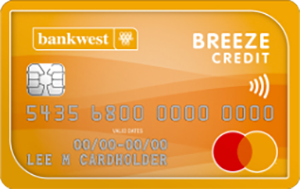
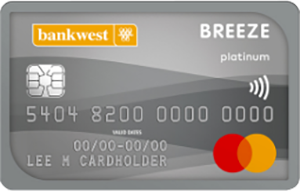
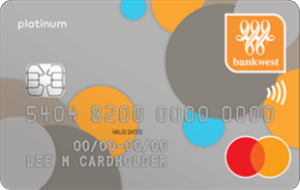
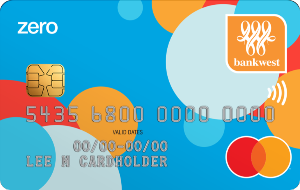
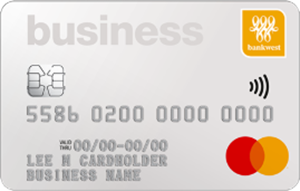
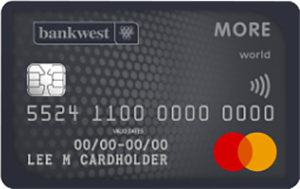
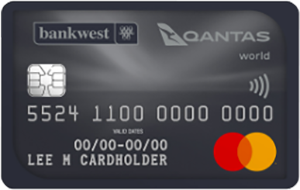
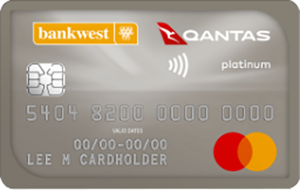
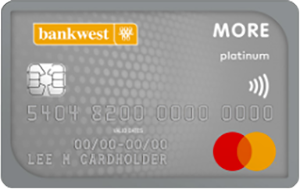
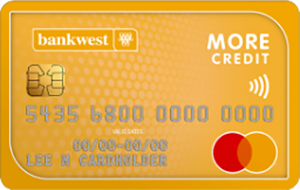
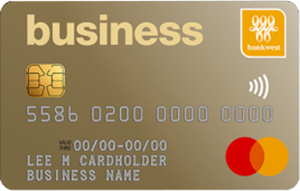







Paul Ainscough
10 October 2023Pauline
13 October 2023Irene Victoria Leng Reddacliff
28 November 2022Pauline
29 November 2022Jill Thompson
29 July 2022Pauline
1 August 2022Victor
8 July 2019Roland
10 July 2019john bowman
17 August 2017Roland
17 August 2017Susan Nicholas
3 July 2017Roland
4 July 2017Linda
17 March 2017Roland
20 March 2017Linda
16 March 2017Roland
17 March 2017Lesley Gulliver
16 March 2017Roland
16 March 2017Robyn
8 March 2017Roland
9 March 2017Suzanne Hauff
13 February 2017Roland
14 February 2017alex
31 October 2015Roland
2 November 2015David
24 February 2014Roland
25 February 2014